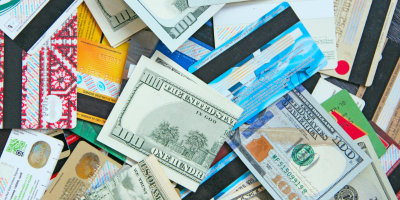I grew up in a big family. Seven of us gathered around the table daily and we always had a few extras to feed as well. My mom practically lived at the grocery store, and Costco was a common place for her to do the majority of her shopping.
My own family is considerably smaller and we have a much smaller budget, but I still love to purchase things in bulk. The problem: if it’s not done carefully, it can max out the entire budget for the month, and we’ll still be missing things we need.
How To Navigate Bulk Purchases on a Budget
The truth is, that by utilizing the following tips, making bulk purchases shouldn’t be difficult.
Tip 1: Create a List (And Stick with It)
I say this over and over again, but it’s such a critical part when it comes to keeping your grocery budget. If you don’t make a list, then you’ll end up purchasing things you don’t need, or having to run back to the grocery store for something you forgot (which normally results in additional purchases).
Check your pantry, fridge, and freezer before each trip to the store and make sure that your list matches up with any meal plan you might have in place. Then, take that list to the store with you and STICK TO IT. The fastest way to ruin a budget is to purchase things that aren’t on your list.
Tip: Grab my FREE printable Grocery Lists HERE.
Tip 2: Embrace a Household Fund
Our budget would not survive if we didn’t embrace the household line item. In fact, we have two: one for monthly household expenses such as paper and cleaning products, and a second for home repair and maintenance expenses. Both line items are a big help when it comes to making bulk purchases.
In our case, I place $100 per month into our Monthly Housing Expense Fund. That allows me to categorize purchases such as toilet paper, paper towels, cleaning supplies, and laundry detergent (although I make that myself now!). When I head out to Costco at the beginning of each month, I purchase those items and deduct them from the allotted $100 budget.
The other great thing about stores like Costco is you can often find household maintenance products at a great discount. One of our favorite purchases is batteries. They are cheaper and yet, if I was going to incorporate them into our consistent monthly budget, it might mean we wouldn’t have enough money to purchase something else we need, such as toilet paper.
It Takes Careful Planning
Thankfully, I’ve allotted a certain amount of money each month to a “Household Maintenance Fund”. It’s similar to an emergency savings fund, in that it allows me to save money toward those incidental housing expenses that might arise throughout the year. Thanks to careful planning, most of the time we have enough to do minor repairs and replacements throughout our home, despite what the monthly budget might look like.
In the case of large purchases, such as batteries, the money can be used at any time to purchase items that help to run our household. We use batteries to help run our security system, so we can quickly categorize that as a household expense and don’t have to carry the expense in the current monthly budget.
If you haven’t implemented these two line items in your budget, I highly recommend you do so.
Need help with creating a budget that accounts for household or other line items? Click HERE to find out about my personal coaching sessions to help you do just that.
Tip 3: Split Purchases Over Extended Timeframe
One of my favorite tricks to keeping the monthly (and weekly) grocery budget intact, while still allowing for some “bulk” purchases is to split the cost of those items over the weeks that you plan to use them.
Because it’s hard to explain in writing, I thought I’d just go ahead and show you, so take a look at the following video.
Don’t you just love the real-life Milly cat walking through the process? She loves to be helpful that way.
Some examples of items I often split over the course of a month include:
- Kids’ lunch items (crackers, chips, yogurts, applesauce cups, etc.)
- Meat
- Canned foods
- Milk (if purchasing multiple containers)
- Cereal
- Bulk Coffee
Note: If you are interested in some of the funds I use and how I use them, feel free to check out THIS POST on that very topic.
Tip 4: Shop At the Same Time Each Month
Consistency is key. When we consistently do the same things in our lives (and budgets) then we find it becomes easier and easier to maintain and find long-term success. The same is true with WHEN you shop.
In our family, due to the nature of a monthly budget with weekly subsets, we do our basic grocery shopping on Sundays. Not only does that allow us to have fresh food to start the week with but, it gives us time to hone in on our meal plan and make a grocery list that keeps us from having to make extra trips throughout the week.
Additionally, we shop ONCE per month at the bulk food stores and that always comes right after the first of the month. The great thing about consistency, though, is that we’ve been doing it so long now that I can budget, to the dollar, what things we will purchase in bulk and how that will affect our household budget and weekly budgets for the month to come. We rarely run out of a bulk item before it’s time to head back and start the month over again and that has saved us a ton of money over the years.
Tip 5: Long-Term Bulk Purchases
Okay, so you’ve conquered the “how to purchase items monthly and not ruin your budget” concept, but what if you want to purchase something that will last over a longer period of time.
Suggestion 1: Utilize “Extra” Money
Right around Christmas time is normally when the bonuses start rolling in and Justin and I have carefully used ours the same way each and every year. Granted, they’ve never been more than a couple of hundred dollars, but we always stick them into a long-term Costco fund that allows us to stock up on items that might last us for a few months. In fact, one year we received $500 and simply took it to Costco in January and filled our pantry (and freezer) with food for the year. It didn’t last us ALL YEAR, obviously, but it took a great deal of pressure off of our typical monthly food budget.
Additionally, when we get rebate checks in the mail or end up with a little extra income that was a “surprise” we often put that toward a fund for bulk purchases.
Another source of “bonus” money might be any tax refund that comes your way. Especially if it’s more than a couple hundred dollars, you might find it valuable to purchase some bulk goods or stick it away for a day when that meat goes on a fantastic sale.
Do you have bonus money that could be well spent in this way?
Suggestion 2: Sacrifice Something Else
This might seem a little counterintuitive on first glance but sacrificing something in this month’s budget in order to make a larger food purchase work over the long-term, might just be the thing to do. In our case, if I know that we want to purchase a large quantity of one item that will be used for several months (and it’s a GREAT price), then I’m typically willing to sacrifice something THIS MONTH so that I don’t have to spend as much NEXT MONTH.
Ultimately the goal is that when I get into next month’s budget, I’ll get a fresh start and I won’t have to spend quite as much (and might even be able to save a little extra).
So, if you can eat out of your freezer or cut a couple of items from that grocery list, then go ahead and make that bulk purchase and start next month with a clean slate.
It’s That Simple
…or it should be. Purchasing in bulk can take a little extra work when it comes to keeping your budget, but if you do the legwork, you will be so much happier at the end of the month.
How about you? Do you purchase in bulk? How do you make it work for your budget? Leave me a comment below so we can swap ideas. I’m always interested to know how others make it work for them!
Have an awesome day!
Tip: Grab my FREE printable Grocery Lists HERE.





